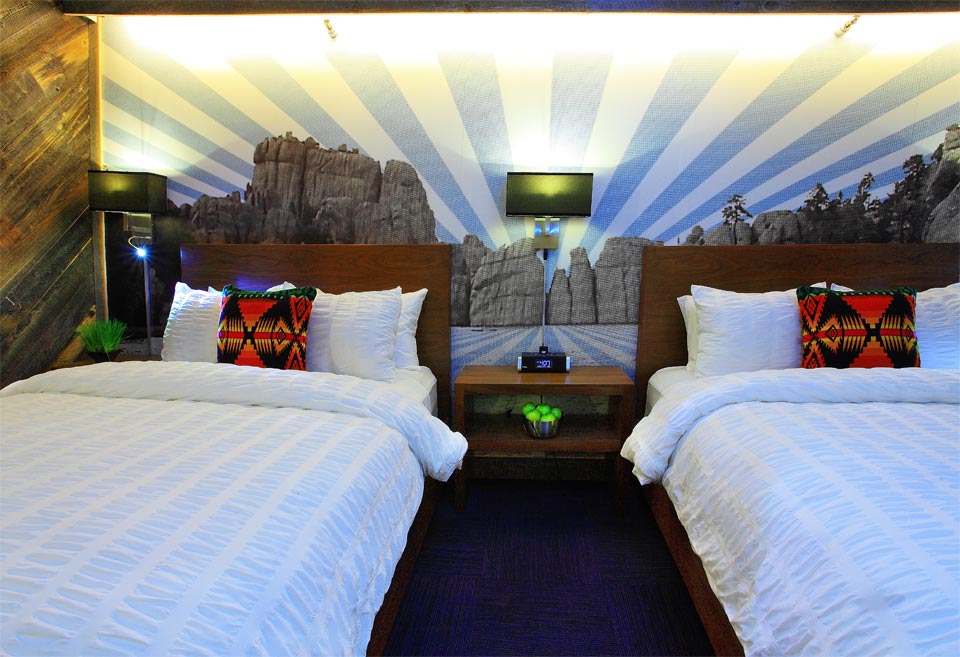What do you get when you combine wild child designer Antonio Ballatore with Mount Rushmore, an old Radisson Hotel and a couple long-time hoteliers who want to reduce the footprint of the hospitality industry?

One of the most exciting hotel concepts since Travelocity simultaneously introduced the Green Guarantee and slapped a peace sign on the Roaming Gnome's pointy hat.
"Most of the cooler materials are green anyway," says Ballatore, who worked with Rapid City, South Dakota's, Adoba Eco Hotel to create a brand new concept in green hotels. "Transforming an existing hotel into LEED-certified lends itself to a lot of cool materials, like recycled rugs and wood, and you gotta love all the inspiring artists and craftspeople doing this work."
Indeed, the oh-so-chic Adoba Eco Hotel makes use of recycled snow fences from Wyoming, recycled soda caps for chandeliers, recycled water bottles for duvets (they're super warm and comfy), old road sign for trash cans and serving trays and sheets made from eucalyptus. And while all of these design elements contribute to the hotel's eventual goal of net zero energy, they also make the Adoba concept, like Ballatore himself was once described, "the Lady GaGa of hotel brands."
Other badass, but more under-the-radar, features of Adoba include solar-thermal water and heating, low flow water fixtures, LED lighting, waste that's compacted and baled, and the Enigma organic restaurant with Greener Planet wines and dishes such as Buffalo Carpaccio with grass-fed local buffalo, prickly-pear oil, fig balsamic and micro greens.
Even the building itself is recycled, having served 15 years as a Radisson in the South Dakota town that serves the Mount Rushmore set.
As owner, Karim Merali says about his decision to be the first to try this new concept in sustainable hospitality, "If you care, it takes a little more effort. You recycle, you treat your environment with respect."

But even more convincing, say James Henderson and Adrienne Pumphrey, the husband and wife team rolling out the new eco-friendly hotel brand, is the bottom line.
"The great thing about going green is that very quickly, by the second or third profit and loss statement, owners notice significant savings in energy consumption, water consumption and waste output," Pumphrey says. "And customer engagement is off the charts."
Although Adoba is just launching (their second hotel opened in Dearborn, Michigan on November 1), they're projecting first year savings of 15 percent energy consumption, 8 percent water and 12 percent waste output. Over time, that can make a significant dent in the 40 percent of fossil fuel energy that's consumed by traditional buildings.
They're even working on a rewards system that gives guests bonus points for not taking 45-minute showers and remembering to turn off their curling irons.
"It's part of our Stash Rewards. We have a system that measures and tracks energy use. Guests who don't leave the water running, who don't require daily sheet washing, get, say, an extra 250 points for water conservation," says Pumphrey, who before rolling out this sustainable hotel plan spent 25 years working for such corporate hotel brands as Marriott, Hilton and Sheraton. "Somebody has to become a leader. Because we're small and nimble, we can make these changes quickly."
On tap in the next few months are four new Adoba Eco conversions (transforming existing properties such as the former Hyatt in Dearborn) and groundbreaking on a new build in Denver.
"We're not just hoping just to change the hotel industry, but to save the world." Pumphrey says.